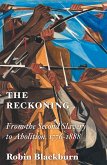An enduring history of how race and class came together to mark the course of the antebellum US and our present crisis. Roediger shows that in a nation pledged to independence, but less and less able to avoid the harsh realities of wage labor, the identity of "white" came to allow many Northern workers to see themselves as having something in common with their bosses. Projecting onto enslaved people and free Blacks the preindustrial closeness to pleasure that regimented labor denied them, "white workers" consumed blackface popular culture, reshaped languages of class, and embraced racist practices on and off the job. Far from simply preserving economic advantage, white working-class racism derived its terrible force from a complex series of psychological and ideological mechanisms that reinforced stereotypes and helped to forge the very identities of white workers in opposition to Blacks. Full of insight regarding the precarious positions of not-quite-white Irish immigrants to the US and the fate of working class abolitionism, "Wages of Whiteness" contributes mightily and soberly to debates over the 1619 Project and critical race theory.








